Unit_1____Will_people_have__robots知识点讲解及其练习(好资料)
初二unit1Unit 1 Will people have robots
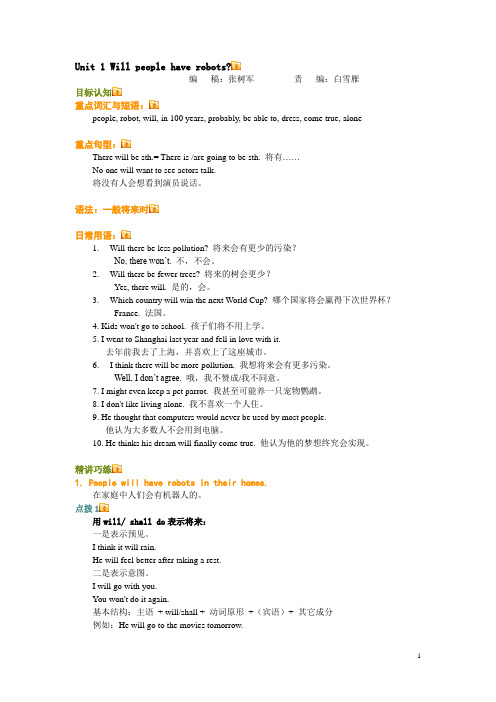
Unit 1 Will people have robots?编稿:张树军责编:白雪雁目标认知重点词汇与短语:people, robot, will, in 100 years, probably, be able to, dress, come true, alone重点句型:There will be sth.= There is /are going to be sth. 将有……No one will want to see actors talk.将没有人会想看到演员说话。
语法:一般将来时日常用语:1. ---Will there be less pollution? 将来会有更少的污染?---No, there won’t. 不,不会。
2. ---Will there be fewer trees? 将来的树会更少?---Yes, there will. 是的,会。
3. ---Which country will win the next World Cup? 哪个国家将会赢得下次世界杯?---France. 法国。
4. Kids won't go to school. 孩子们将不用上学。
5. I went to Shanghai last year and fell in love with it.去年前我去了上海,并喜欢上了这座城市。
6. ---I think there will be more pollution. 我想将来会有更多污染。
---Well, I don’t agree. 哦,我不赞成/我不同意。
7. I might even keep a pet parrot. 我甚至可能养一只宠物鹦鹉。
8. I don't like living alone. 我不喜欢一个人住。
9. He thought that computers would never be used by most people.他认为大多数人不会用到电脑。
新目标英语八年级下册Unit1Willpeoplehaverobots知识点
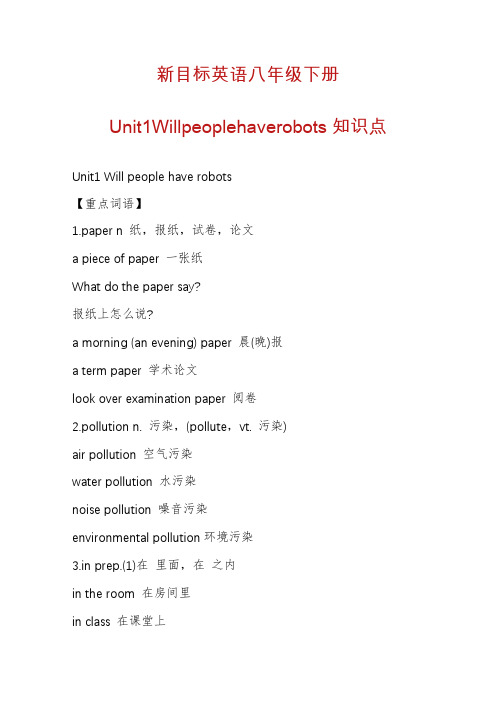
新目标英语八年级下册Unit1Willpeoplehaverobots知识点Unit1 Will people have robots【重点词语】1.paper n 纸,报纸,试卷,论文a piece of paper 一张纸What do the paper say?报纸上怎么说?a morning (an evening) paper 晨(晚)报a term paper 学术论文look over examination paper 阅卷2.pollution n. 污染,(pollute,vt. 污染)air pollution 空气污染water pollution 水污染noise pollution 噪音污染environmental pollution环境污染3.in prep.(1)在里面,在之内in the room 在房间里in class 在课堂上(2)在(某段时间)之间in the morning 在早上in the past 在过去I′ll come back in a day or two我过一两天就会回来in,after,later 接时间段,都可表示“(一段时间)之后”,它们有什么区别呢?①“in+一段时间”指“(将来的)一段时间之后”。
What will you be in five years?五年之后你干什么?We’ll start off in ten minutes.我们十分钟后出发。
②“after+一段时间”或“一段时间+later”表示“(在过去某个时间看来)一段时间之后”。
He went home after two days.他两天后回家了。
Three years later,she had a baby.三年后,她生了一个婴儿。
4.less adj. 较少的;少量的(little的比较级)They buy less beer and fewer cigarettes now现在他们买的啤酒和香烟比以前少了。
八年级英语下册 Unit1《Will people have robots》机器人简介文字素材 人教新目标版
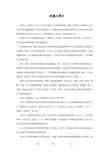
机器人简介实用上,机器人(Robot)是自动执行工作的机器装置。
机器人可接受人类指挥,也可以执行预先编排的程序,也可以根据以人工智能技术制定的原则纲领行动。
机器人执行的是取代或是协助人类工作的工作,例如制造业、建筑业,或是危险的工作。
机器人可以是高级整合控制论、机械电子、计算机、材料和仿生学的产物。
目前在工业、医学甚至军事等领域中均有重要用途。
欧美国家认为:机器人应该是由计算机控制的通过编排程序具有可以变更的多功能的自动机械,但是日本不同意这种说法。
日本人认为“机器人就是任何高级的自动机械”,这就把那种尚需一个人操纵的机械手包括进去了。
因此,很多日本人概念中的机器人,并不是欧美人所定义的。
现在,国际上对机器人的概念已经逐渐趋近一致。
一般说来,人们都可以接受这种说法,即机器人是靠自身动力和控制能力来实现各种功能的一种机器。
联合国标准化组织采纳了美国机器人协会给机器人下的定义:“一种可编程和多功能的,用来搬运材料、零件、工具的操作机;或是为了执行不同的任务而具有可改变和可编程动作的专门系统。
”机器人能力的评价标准包括:智能,指感觉和感知,包括记忆、运算、比较、鉴别、判断、决策、学习和逻辑推理等;机能,指变通性、通用性或空间占有性等;物理能,指力、速度、连续运行能力、可靠性、联用性、寿命等。
因此,可以说机器人是具有生物功能的空间三维坐标机器。
机器人发展简史(引自《环球科学》2007年第二期)1920年捷克斯洛伐克作家卡雷尔•恰佩克在他的科幻小说《罗萨姆的机器人万能公司》中,根据Robota(捷克文,原意为“劳役、苦工”)和Robotnik(波兰文,原意为“工人”),创造出“机器人”这个词。
1939年美国纽约世博会上展出了西屋电气公司制造的家用机器人Elektro。
它由电缆控制,可以行走,会说77个字,甚至可以抽烟,不过离真正干家务活还差得远。
但它让人们对家用机器人的憧憬变得更加具体。
1942年美国科幻巨匠阿西莫夫提出“机器人三定律”。
八年级下英语第一单元知识点总结
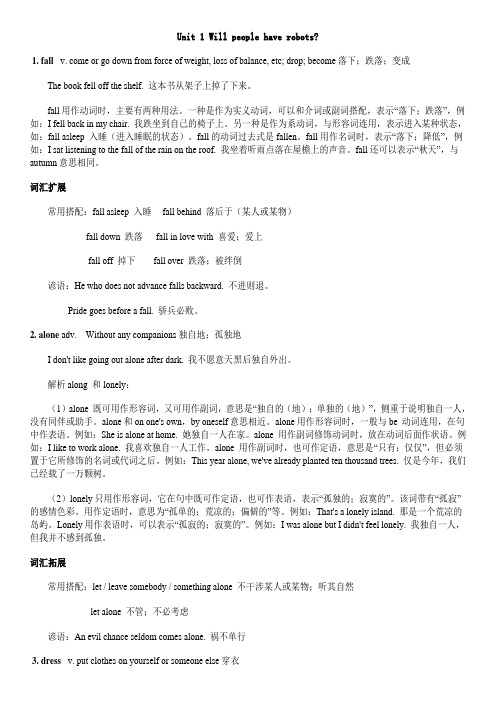
Unit 1 Will people have robots?1. fall v. come or go down from force of weight, loss of balance, etc; drop; become 落下;跌落;变成The book fell off the shelf. 这本书从架子上掉了下来。
fall用作动词时,主要有两种用法。
一种是作为实义动词,可以和介词或副词搭配,表示“落下;跌落”,例如:I fell back in my chair. 我跌坐到自己的椅子上。
另一种是作为系动词,与形容词连用,表示进入某种状态,如:fall asleep 入睡(进入睡眠的状态)。
fall的动词过去式是fallen。
fall用作名词时,表示“落下;降低”,例如:I sat listening to the fall of the rain on the roof. 我坐着听雨点落在屋檐上的声音。
fall还可以表示“秋天”,与autumn意思相同。
词汇扩展常用搭配:fall asleep 入睡fall behind 落后于(某人或某物)fall down 跌落fall in love with 喜爱;爱上fall off 掉下fall over 跌落;被绊倒谚语:He who does not advance falls backward. 不进则退。
Pride goes before a fall. 骄兵必败。
2. alone adv. Without any companions 独自地;孤独地I don't like going out alone after dark. 我不愿意天黑后独自外出。
解析along 和lonely:(1)alone 既可用作形容词,又可用作副词,意思是“独自的(地);单独的(地)”,侧重于说明独自一人,没有同伴或助手。
alone和on one's own,by oneself意思相近。
八年级新目标Unit 1 Will people have robots(知识点和测试题)
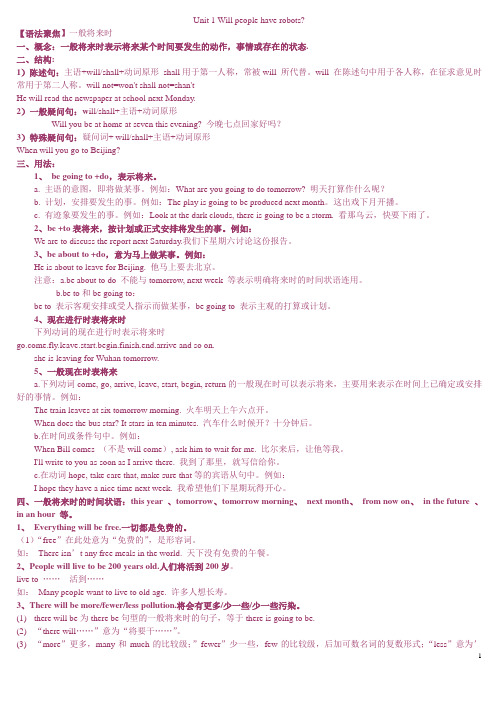
Unit 1 Will people have robots?【语法聚焦】一般将来时一、概念:一般将来时表示将来某个时间要发生的动作,事情或存在的状态.二、结构:1)陈述句:主语+will/shall+动词原形shall用于第一人称,常被will 所代替。
will 在陈述句中用于各人称,在征求意见时常用于第二人称。
will not=won't shall not=shan'tHe will read the newspaper at school next Monday.2)一般疑问句:w ill/shall+主语+动词原形Will you be at home at seven this evening? 今晚七点回家好吗?3)特殊疑问句:疑问词+ will/shall+主语+动词原形When will you go to Beijing?三、用法:1、be going to +do,表示将来。
a. 主语的意图,即将做某事。
例如:What are you going to do tomorrow? 明天打算作什么呢?b. 计划,安排要发生的事。
例如:The play is going to be produced next month。
这出戏下月开播。
c. 有迹象要发生的事。
例如:Look at the dark clouds, there is going to be a storm. 看那乌云,快要下雨了。
2、be +to表将来,按计划或正式安排将发生的事。
例如:We are to discuss the report next Saturday.我们下星期六讨论这份报告。
3、be about to +do,意为马上做某事。
例如:He is about to leave for Beijing. 他马上要去北京。
注意:a.be about to do 不能与tomorrow, next week 等表示明确将来时的时间状语连用。
Unit 1 Will people have robots 重点语法和短语

Unit 1 Will people have robots? 重点语法和短语重点语法:一般将来时态的应用do/does 的一般将来时态形式:(shall/will) dodo/does 的一般将来时态的被动语态:(shall/will) be done 一般将来时态的肯定句、否定句、疑问句形式:肯定句例句:People will have robots in a few years.否定句例句:People (will not/won't) have robots in a few years. 一般疑问句例句:Will people have robots in a few years?特殊疑问句例句:What will people have in a few years?重点短语:won't = will notthey'll = they willshe'll = she willhe'll = he willI'll = I willfall in love with(sb./sth.) 爱上(某人/某物)be able to do sth. 能够做某事come true 实现in the future 未来hundreds of 数以百计的thousands of 数以千计的look for(sb./sth.) 寻找(某人/某物)will → would 情态动词will 的原形和过去式may → might 情态动词may 的原形和过去式Reading Strategy(阅读方法)Look at the title and picture, and predict what you will read about. (看着标题和图片,预知你要阅读那些方面的内容。
)This helps you get ready to acquire new information. (这样可以帮助你获得一些新的信息。
Unit 1 Will people have robots教案1
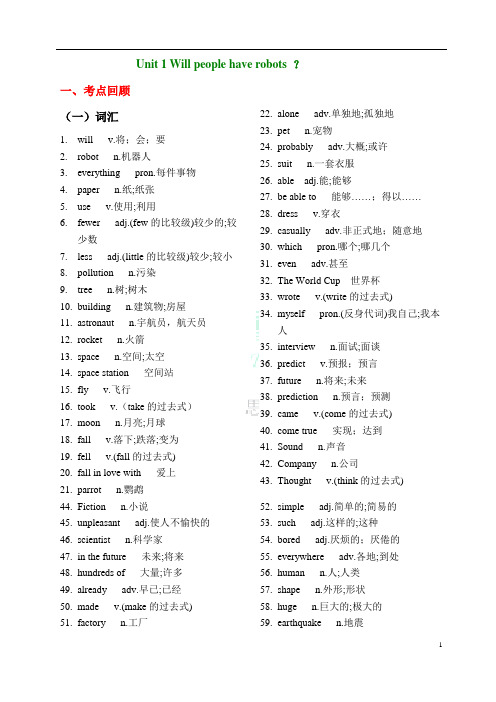
Unit 1 Will people have robots ?一、考点回顾(一)词汇1.will v.将;会;要2.robot n.机器人3.everything pron.每件事物4.paper n.纸;纸张e v.使用;利用6.fewer adj.(few的比较级)较少的;较少数7.less adj.(little的比较级)较少;较小8.pollution n.污染9.tree n.树;树木10.building n.建筑物;房屋11.astronaut n.宇航员,航天员12.rocket n.火箭13.space n.空间;太空14.space station 空间站15.fly v.飞行16.took v.(take的过去式)17.moon n.月亮;月球18.fall v.落下;跌落;变为19.fell v.(fall的过去式)20.fall in love with 爱上21.parrot n.鹦鹉22.alone adv.单独地;孤独地23.pet n.宠物24.probably adv.大概;或许25.suit n.一套衣服26.able adj.能;能够27.be able to 能够……;得以……28.dress v.穿衣29.casually adv.非正式地;随意地30.which pron.哪个;哪几个31.even adv.甚至32.The World Cup 世界杯33.wrote v.(write的过去式)34.myself pron.(反身代词)我自己;我本人35.interview n.面试;面谈36.predict v.预报;预言37.future n.将来;未来38.prediction n.预言;预测39.came v.(come的过去式)e true 实现;达到41.Sound n.声音pany n.公司43.Thought v.(think的过去式)44.Fiction n.小说45.unpleasant adj.使人不愉快的46.scientist n.科学家47.in the future 未来;将来48.hundreds of 大量;许多49.already adv.早已;已经50.made v.(make的过去式)51.factory n.工厂52.simple adj.简单的;简易的53.such adj.这样的;这种54.bored adj.厌烦的;厌倦的55.everywhere adv.各地;到处56.human n.人;人类57.shape n.外形;形状58.huge n.巨大的;极大的59.earthquake n.地震60.snake n.蛇61.possible adj.可能的62.electric adj.电的;导电的63.toothbrush n.牙刷64.seem v.像是;似乎65.impossible adj.不可能的;不会发生的66.housework n.家务;家务事67.rating n.级别;等级(二)重点短语1. make predictions 做预测2. free time 空闲时间3. fly…to…乘坐…飞往…4. on a space station 在太空站上5. I disagree. 我不同意.6. fall/be in love with sb. 与sb.相爱7. keep pets 养宠物8. be able to 能够9. predict the future 预测未来10. come true 实现11. see sb. do sth. 看见sb.做某事(的全过程)doing sth. 看见sb.正在做某事(片断)12. help sb. with sth. 帮助某人做某事13. hundreds of 数以百计的14. try to do sth. 尽力做某事15. look like 看上去长的像…16. look for 寻找17. 一段时间+ from now (从现在起)…之后from now on = in the future 今后18.help sb. do/with sth 帮助做…19.make sb do sth 使某人做…make sb + adj 使某人怎么样了…20.it is … (for sb) to do sth 对某人来说做… 怎么样21.the same … as 和… 一样22.over and over again反复。
Unit1Willpeoplehaverobots重点单词

• 7.fall v.落下,跌落 过去式 fell • fall in love with 爱上某人或某物 • fall down 跌倒,失败,倒塌
• 7.alone adv.单独地,孤独地
• 我希望他们今后能更慎重一些。
• 19. Such作形容词,意思是“如此的”“这样 的”,修饰各种名词。
• (1)Such这样的。如It is such bad weather.天气 如此恶劣。
• (2)Such常和as搭配,表示一种类别。如We enjoy such a voice as hers.我们喜欢象她那样的 嗓子。
• That sounds interesting.
• 16.unpleasant adj. 使人不愉快的 • pleasant adj. 使人愉快的 • 17.in the future 未来,将来 • in future今后,从今往后
• The boy wants to become a player in the future.这个男孩想在将来成为一名运动 员。 I hope they'll be more careful in future.
或复数名词被many, few等表示量的形容 词修饰时,用so,不用such. • 20.bored adj.厌烦的,厌倦的 • boring adj.使人厌烦的,使人厌倦的
• I feel bored.
• This lesson is rபைடு நூலகம்ally boring.
• 21.不规则动词 • fly------flew take------took • fall-----fell write-----wrote • make---made come---came • build---built think---thought
人教版英语八年级上册Unit7《Will people have robots_》知识点
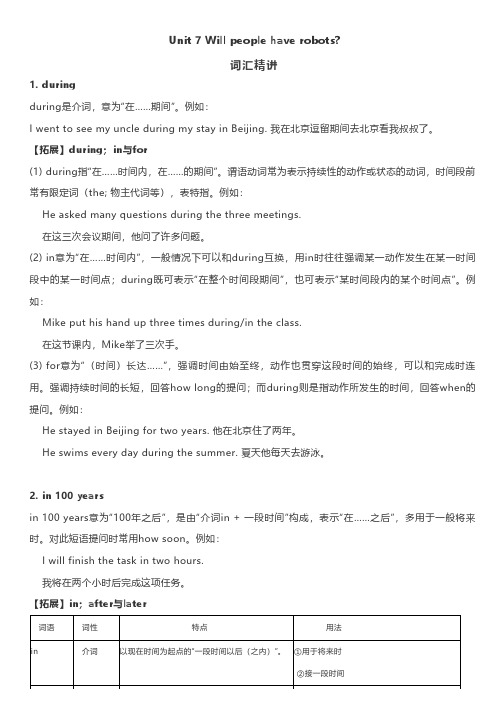
Unit 7 Will people have robots?词汇精讲1. duringduring是介词,意为“在……期间”。
例如:I went to see my uncle during my stay in Beijing. 我在北京逗留期间去北京看我叔叔了。
【拓展】during;in与for(1) during指“在……时间内,在……的期间”。
谓语动词常为表示持续性的动作或状态的动词,时间段前常有限定词(the; 物主代词等),表特指。
例如:He asked many questions during the three meetings.在这三次会议期间,他问了许多问题。
(2) in意为“在……时间内”,一般情况下可以和during互换,用in时往往强调某一动作发生在某一时间段中的某一时间点;during既可表示“在整个时间段期间”,也可表示“某时间段内的某个时间点”。
例如:Mike put his hand up three times during/in the class.在这节课内,Mike举了三次手。
(3) for意为“(时间)长达……”,强调时间由始至终,动作也贯穿这段时间的始终,可以和完成时连用。
强调持续时间的长短,回答how long的提问;而during则是指动作所发生的时间,回答when的提问。
例如:He stayed in Beijing for two years. 他在北京住了两年。
He swims every day during the summer. 夏天他每天去游泳。
2. in 100 yearsin 100 years意为“100年之后”,是由“介词in + 一段时间”构成,表示“在……之后”,多用于一般将来时。
对此短语提问时常用how soon。
例如:I will finish the task in two hours.我将在两个小时后完成这项任务。
浙江省温州市第二十中学八年级英语下册 Unit 1 Will people have robots教
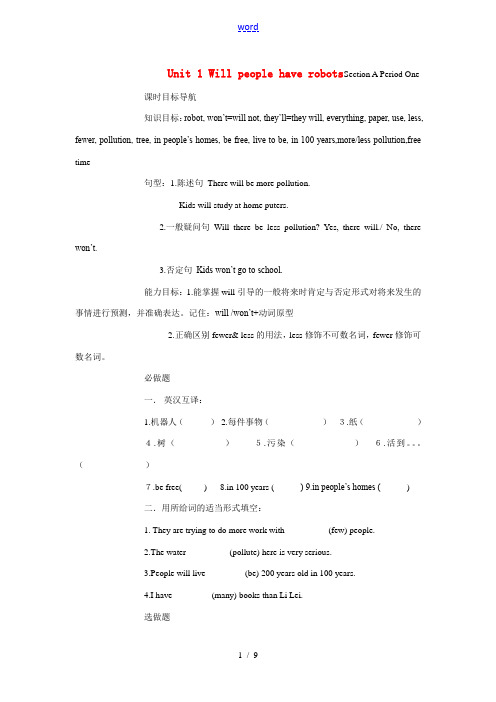
Unit 1 Will people have robots Section A Period One 课时目标导航知识目标:robot, won’t=will not, they’ll=they will, everything, paper, use, less, fewer, pollution, tree, in people’s homes, be free, live to be, in 100 years,more/less pollution,free time句型:1.陈述句There will be more pollution.Kids will study at home puters.2.一般疑问句Will there be less pollution? Yes, there will./ No, there won’t.3.否定句Kids won’t go to school.能力目标:1.能掌握will引导的一般将来时肯定与否定形式对将来发生的事情进行预测,并准确表达。
记住:will /won’t+动词原型2.正确区别fewer& less的用法,less修饰不可数名词,fewer修饰可数名词。
必做题一.英汉互译:1.机器人()2.每件事物()3.纸()4.树()5.污染()6.活到。
()7.be free( ) 8.in 100 years ( ) 9.in people’s homes ()二.用所给词的适当形式填空:1. They are trying to do more work with _________ (few) people.2.The water _________ (pollute) here is very serious.3.People will live ________ (be) 200 years old in 100 years.4.I have ________ (many) books than Li Lei.选做题请根据句意,用more/less/fewer填空1. We can use cars ______ and plant _______ trees to fight pollution.2. Kim likes reading, so he spends _______ money on books than the other things.3. If we have robots, we can finish the work with ______ people and _______ time.4. I have _______ apples than you.You should give me some.5. Our city will bee more beautiful. I think there will be ______ tall buidings and ______ pollution in it.提高题请用括号里所给动词的适当形式填空1. There________ ( be) a sports meeting in our school next week.2. Mary is unhappy because she ___________ (not have) any day off next week.3. The Greens __________ (go) to France two years ago.They ________ (e) back in a month.4. Maria often ___________ (walk) to school. But she __________ (ride)her bicycle to school next week.5. Tony __________ (wan) to be a boss of a big pany in three years. I don’t think his dream _________ (e) true.八年级下Unit 1 Will people have robots ?Section A Period Two课时目标导航知识目标:buiding, she’ll=she will, be free,in high school,in college,five years ago, in five years句型:What do you think Sally will be in five years ?I think there will be more tall buidings.理解:作插入语时,意为“你认为”,放在特殊疑问句词后,疑问句的其他部分应用陈述句语序。
初中英语《Unit1Willpeoplehaverobots》单元教学设计以及思维导图

测和设想。 5、能够运用所给信息,如标题,图片等预测文章大意。 知识目标: 通过本单元的学习,学生能: ·熟练掌握以下单词:will, robot, everything, paper, use, fewer, less, tree, building, space, fly, took, moon, fall, fell, alone, pet, probably, able, dress, which, even, wrote. 能在文章中识别并在听力对话中听 出以下词汇及表达:pollution, astronaut, rocket, fall in love with. ·熟练掌握本单元 Grammar Focus 中的句型以及介绍自己如何到达 目的地的相关句子: Will there be less pollution ? No, there won’t . There will be more pollution. Will there be fewer trees ? Yes, there will. Kids won’t go to school . Kids will study at home on computer. 学习策略: 通过本单元的学习,学生能: 1、在学习词汇、语法的过程中,感知回忆、联想、想象等识记策 略。 2、听录音前,通过观看 PPT 呈现的图片及浏览相关文字信息,体 验、训练“预测听力相关内容”的策略。 3、在听力过程中,体验、实践“在泛听、精听的过程中抓关键句”的
Unit 1 Will people have robots
适用年级
八年级
所需时间
课内共用 4 课时,每周 5 课时;课外共用 1 课时
主题单元学习概述
本单元是鲁教版八年级上册第一单元,是承前启后的一个单元,它
Unit1(1)Will people have robots

Will people have robots in their homes ? Will people use money in 100 years ? Yes, they will.
Will books be only on computer ?
Will kids go to school ? Will they study at home ? Will there only be one country ? No, they/ there won’t .
Will people live to be 200 years old ?
in the future
Will people have robots
in people’s homes ?
Yes ,they will. People will have robots in their homes No ,they won’t=will not
in the future
There will only be one country. People will live to be 200 years old.
Will
every
home have a
car?
Yes ,they will They will have a car.
Will these be true in the future?
in the future
robot
People will have robots in their homes.Βιβλιοθήκη in the future
People won’t use money. Everything will be free.
八年级英语上册《Unit7Willpeoplehaverobots》的知识点归纳
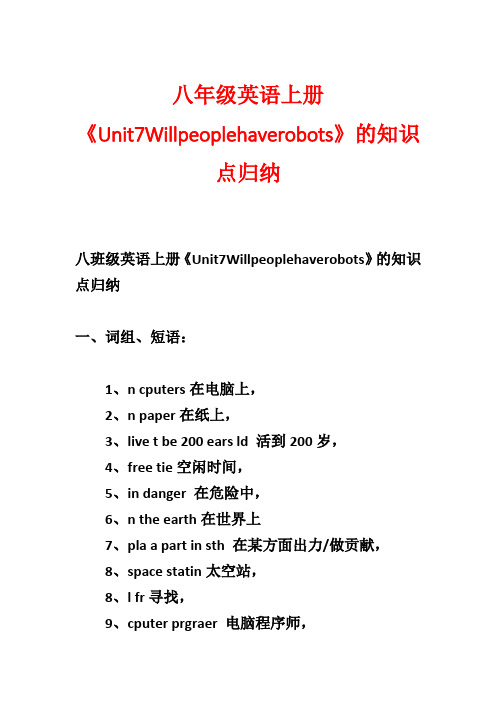
八年级英语上册《Unit7Willpeoplehaverobots》的知识点归纳八班级英语上册《Unit7Willpeoplehaverobots》的知识点归纳一、词组、短语:1、n cputers在电脑上,2、n paper在纸上,3、live t be 200 ears ld 活到200岁,4、free tie空闲时间,5、in danger 在危险中,6、n the earth在世界上7、pla a part in sth 在某方面出力/做贡献,8、space statin太空站,8、l fr寻找,9、cputer prgraer 电脑程序师,10、in the future 在将来,11、hundreds f成百上千的.,12、the sae…as与…一样,13、ver and ver again 反复,14、get bred 无聊,abe/perhaps 用于句首。
Mabe/Perhaps u are right.1. during / fr / in 介词,在……期间。
说到某事是在某一段时间之间发生的用during; 说到某事持续多久则用fr; 说到某事具体发生的时间用in.We visited an places f interest during the suer hlida.I’ve been here fr tw we es.The usuall leave schl in ul.一般将来时结构:肯定式:主语+ will/shall + 动词原形+ 其他will 用于各种人称,shall 用于第一人称。
主语+ be ging t + 动词原形+ 其他be 随人称、数和时间的变化而变换。
否定式:在will/shall/be 后面加nt. will nt = wn’t .一般疑问句:将will/shall/be 提到主语前面。
There be 句型的一般将来时:There will be + 主语+ 其他,意为:将会有。
初中英语《Unit1Willpeoplehaverobots》单元教学设计以及思维导图2
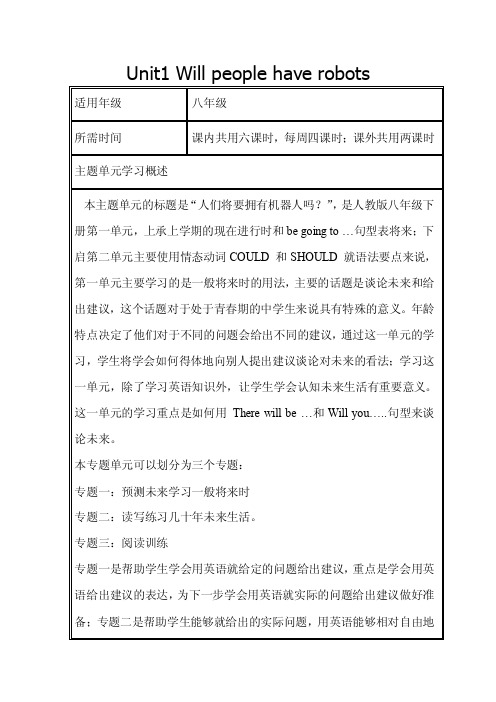
乃至书面给出建议。专题三是研究性学习专题,在以上两个专题学习的 基础上,让学生研究总结利用好一般将来谈论未来。 主要的学习方式:情境学习,问题学习,合作学习,探究学习。 预期的学习成果:学生学会较自由地运用英语谈论未来。 主题单元规划思维导图
主题单元学习目标 语言知识: 1.Master words “robot,pollution...” and the sentences “There will be less pollution.Will there be the...? Yes, there will. No, there won’t.
fiction movies? 2. What can the robots do for people? 2).Read paragraph 2 answer:
Q: 1. How long do some scientists think people will have robots in their homes?
专题三
阅读训练
所需课时
2 课时
专题学习目标
1.Talking about “robots in the future” Using the words and the prases. The words: unpleasant,scientist, however, hundreds of, already, factory, simple, such, everywhere, human, shape , snake, shape, possible, electric, seem, impossible, housework. The prases : the same as, make …do…, to take…, to help do…, to help with… 2.Teaching Ss to learn to guess the new words in the sentence. Consolidating the Simple Future Tense by reading.
初中英语《Unit1Willpeoplehaverobots》单元教学设计以及思维导图
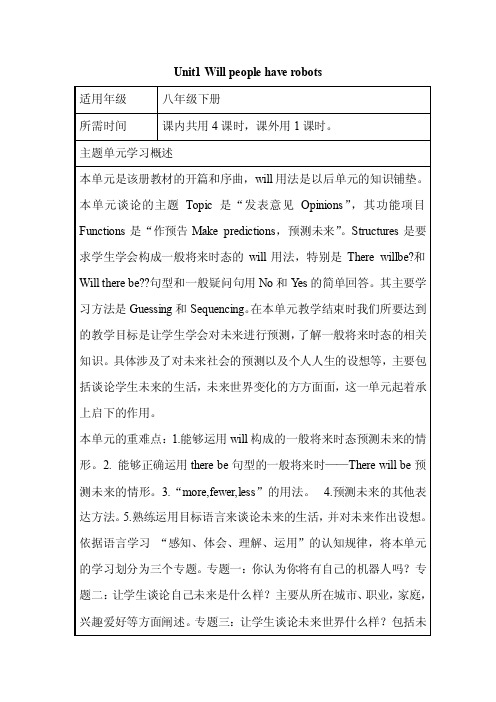
上启下的作用。
本单元的重难点:1.能够运用 will 构成的一般将来时态预测未来的情
形。2. 能够正确运用 there be 句型的一般将来时——There will be 预
测未来的情形。3.“more,fewer,less”的用法。 4.预测未来的其他表 达方法。5.熟练运用目标语言来谈论未来的生活,并对未来作出设想。
对应课标 1.对英语学习表现出积极性和初步的自信心。 2.能听懂有关熟悉话题的谈话,并能从中提取信息和观点。 3.能有效地询问信息和请求帮助。 4.能以小组讨论的方式起草和修改作文。 5.能预测未来,参与简单的角色扮演等活动。 6.能尝试使用适当的学习方法,克服学习中遇到的困难。
1.Do you think you will have your own robot?
评价要点
1.能用适当的语音语调正确朗读本单元中的句型、对 话和短文。 2.根据 3a 阅读语篇任务所建构的篇章结构,学生能 复述 3a 并写一篇关于自己未来生活的文章。。 3.能运用所学句型说出对未来社会的预测以及个人 人生的设想等。 4.能够阅读文章,理解大意,找出相关信息。 5.通过学生自评,学生互评,教师评价等对上述内容 进行评价
主题单元问题 2.What will your life be like in the future?
设计
3.What will the world be like in the future?
专题一:1.Do you think you will have your own robot? ( 2 课时)
专题划分
专题二:2.What will your life be like in the future? ( 1 课时)
Unit-1-Will-people-have-robots知识点总结
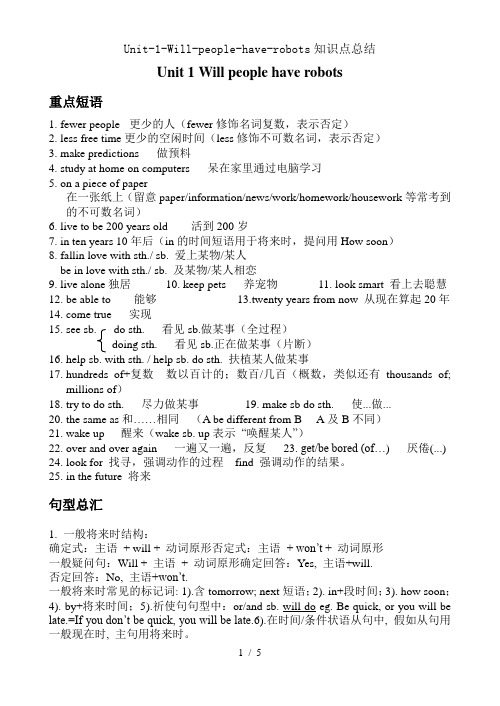
Unit 1 Will people have robots重点短语1. fewer people 更少的人(fewer修饰名词复数,表示否定)2. less free time更少的空闲时间(less修饰不可数名词,表示否定)3. make predictions 做预料4. study at home on computers 呆在家里通过电脑学习5. on a piece of paper在一张纸上(留意paper/information/news/work/homework/housework等常考到的不可数名词)6. live to be 200 years old 活到200岁7. in ten years 10年后(in的时间短语用于将来时,提问用How soon)8. fallin love with sth./ sb. 爱上某物/某人be in love with sth./ sb. 及某物/某人相恋9. live alone独居10. keep pets 养宠物11. look smart 看上去聪慧12.be able to 能够13.twenty years from now 从现在算起20年e true 实现15.see sb. do sth. 看见sb.做某事(全过程)doing sth. 看见sb.正在做某事(片断)16.help sb. with sth. / help sb. do sth. 扶植某人做某事17.hundreds of+复数数以百计的;数百/几百(概数,类似还有thousands of;millions of)18.try to do sth. 尽力做某事19. make sb do sth. 使...做...20.the same as和……相同(A be different from B A及B不同)21.wake up 醒来(wake sb. up表示“唤醒某人”)22.over and over again 一遍又一遍,反复23. get/be bored (of…) 厌倦(...)24.look for 找寻,强调动作的过程find 强调动作的结果。
- 1、下载文档前请自行甄别文档内容的完整性,平台不提供额外的编辑、内容补充、找答案等附加服务。
- 2、"仅部分预览"的文档,不可在线预览部分如存在完整性等问题,可反馈申请退款(可完整预览的文档不适用该条件!)。
- 3、如文档侵犯您的权益,请联系客服反馈,我们会尽快为您处理(人工客服工作时间:9:00-18:30)。
Unit 1 Will people have robots?知识点:需要背诵的是:第6页的3a1、一般将来时a)一般将来时的构成:由助动词shall或will加动词原形构成,shall用于第一人称。
在口语中,will在名词或代词后常简略为‟ll,will not常简略为won‟t。
这个时态的肯定,否定和疑问结构可表示如下:肯定句否定句疑问句I (We)shall(will) go.You(He, She, They) will go. I(We)shall(will)not go.You(He, She,They)will not go.ShallI(we)go?Will you(he, she,they)go?用”be going to +动词原形”也可表示将来时,表示将要发生的事,打算或决定要做的事。
I think it is going to snow.我看要下雪。
b)一般将来时的用法:1)表示将要发生的动作或情况;2)不以人的意志为转移,肯定要发生的事情。
The day after tomorrow will be National Day.后天是国庆日。
c) 一般将来时的时间状语标志词:1.含tomorrow; next短语;2.in+段时间;3.how soon;4.by+将来时间;5.by the time sb.do…6.祈使句句型中:or/and sb. will do7.在时间/条件状语从句中, 如果从句用一般现在时, 主句用将来时8.another day2、in 与after的区别in是指以现在时间为起点的“在一段时间以后”。
也可以表示“在将来多少时间之内”,句子中的谓语动词要用一般将来时态;after常指以过去时间为起点的“一段时间之后”,所以它与过去时态连用。
当after指某个特定的未来时刻或日期之后,或指以将来某一时间为起点的若干时间之后时,它可以与将来时态连用。
例句:I'll be back in half an hour. 我半小时后就回来.本句中的in作"以后"解,不能用after代替。
after和in都可以表示"以后"的意思,其区别是:1)after以过去为起点,表示过去一段时间以后,常用于过去时态的句子。
例如:They started working after lunch. 他们是午餐后开始工作的。
The film was shown after the meeting. 电影是会议结束以后放的。
2)in以现在为起点,表示将来一段时间以后,常用于将来时态的句子。
如:They will start working in half an hour. 他们将在半小时后开始工作。
The film will be shown in 2 or 3 days. 这部电影将在两三天后上映。
3)在某个特定的时间以后,after也可用于将来时态的句子。
例如:They will start working after 10 am. 他们将在上午10点以后开始工作。
The film will be shown after 5 o'clock. 这部电影将于4点以后上映。
4) “after+一段时间”或“一段时间+later”表示“(在过去某个时间看来)一段时间之后”。
He went home after two days.他两天后回家了。
Three years later,she had a baby.三年后,她生了一个婴儿。
征对性练习一. 根据句意,用括号中动词的适当形式填空。
1. We________(go) fishing tomorrow.2. What are you going________(do) thisevening?3. —Would you like to play football with us?—I'd love to. But I________(help) my mother after lunch.4. —Is your brother in?—Yes. But he____(leave) for Egypt soon.5. —What time________we________ (start)? —At eight tomorrow morning.二.请在下列各题空格处填入shall或will。
1.You ______ not drive through a red light. 2.I ______ do everything for her.3.______ you help me with this heavy bag, John?4.______ I help you with that heavy bag, Madam?5.Let's go and take a walk after dinner, ____ we?6."No one ______ leave the classroom if I haven't said Okay," said the teacher.7.It ______ soon be over, I am sure.8.Do what you ______ , but don't go out.9.I ______ take you there with me, if it's OK with your mother.10.Rain or shine, I ______ come.3.fall的短语:n.秋天,秋季v.掉落,掉下(1)fall behind:落在······的后面e.g. Work harder,or you will fall behind others.(2)fall off:从······上掉下来e.g. Mary fell off the ladder last night.(3)fall in love with(4) fall over4、There be结构英语中,There be句型常表示某处有某人或某物。
例如:There are always more than one hundred birds in the big tree every evening. 每天傍晚那棵大树上总会有100多只小鸟。
一、There be句型的用法: 1)There与be中间可插入一些表示推测的情态动词、表示时态的短语和一些动词短语,以强调某种语气。
例如:There must be some flowers in the box. 盒子里肯定有些鲜花。
There happened to be some money in my pocket.我的口袋里碰巧有一些钱。
There will be a meeting this afternoon.注意:be 不能换成have及have的变化形式。
2)There be句型常与过去时间状语连用,构成一些固定句型,用于故事发生的开头,交代故事发生的时间。
例如:Many years ago,there was such a beautiful girl called Cindy.很久以前有一个叫Cindy的美丽女孩。
3)There be句型可换成There come / go,以引起注意,加强语气。
例如:There comes the bus.公共汽车来了。
4)There be句型或There加其他动词的句型,其动词的单复数,常采用就近一致的原则。
例如:There is a desk, two chairs and three benches in the room. There are two chairs, a desk and three benches in the room.5)There be或There加其他动词的句型,其反意疑问句一律用…there?例如:There is a cat in the garden, isn't there?There used to be no house here, used there / did there?(过去这儿没有房子,是吗?)二、使用There be句型时应注意:1、there be 结构中的be是可以运用各种时的。
There is going to be a meeting tonight.今晚有个会议。
There was a knock at the door.有人敲门。
There has been a girl waiting for you.有个女孩一直在等你。
There will be rain soon.不久天就要下雨了。
2. 动词be单复数形式要跟there be之后的真正的主语一致。
并且要根据就近一致原则来变换be的单复数形式。
如:There is a book on the desk.课桌上有一本书。
How many people are there in the city?这个城市里有多少人口。
There is a pen and two books on the desk.课桌上有一个钢笔和两本书。
3. 在there be引起的句子结构中,用来修饰主语的不定式主动形式和被动形式均可。
There is no time to lose(= to be lost).时间紧迫。
There is nothing to see(=to be seen).看不见有什么。
There is nothing to do.(=to be done)无事可做。
4、There is no doing.(口语)不可能……. There is no telling when he will be back.无法知道他什么时候回来。
There is no knowing what he is doing.无法知道他在做什么。
4、.there be与have的区别:1)含义不同。
there be表示的是“某地(时)有某人(物)”,强调“存在关系”。
Have则表示“某人(物)所有”,强调“所属关系”。
如,There is a bus in your factory.(公共汽车不一定属于我们厂所有)Our factory has a bus.(公共汽车属于我们厂所有)2)句型不同。
there be句型为“There be +某人(物)+某时(地)”;have 句型为“某人(物)+have(has)+某物(人)。
